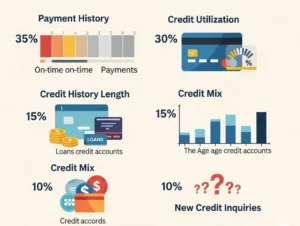Unlock Your New Home: CIBIL Score Essential
Purchasing a home is more than just a financial choice. It’s a milestone in your life. Before you can get the keys to that dream house, your CIBIL rating is a crucial factor. This three-digit number is heavily used by Indian lenders to determine creditworthiness.
Understanding how your CIBIL rating impacts your home loan eligibility, whether you are a first-time purchaser or upgrading your property, is important.
This blog will take you through all you need to learn, from how a CIBIL score is calculated to how it influences loan terms to what you can improve. Let’s get to the basics.
Understanding CIBIL Scores
Your CIBIL is a three-digit score that reflects the creditworthiness of your finances. This score is a key factor in determining whether you are eligible for loans, especially home loans. Understanding how it is calculated will help you to take control of your financial life.
Definition and Importance of CIBIL Scores
TransUnion CIBIL is one of India’s largest credit bureaus. It provides a numerical summary of your credit rating, ranging between 300 and 900. The higher your score, the more reliable you seem to lenders.
The score is used to determine the risk involved in lending money by financial institutions and banks, especially for large-ticket loans such as home loans.
In general:
- The 750 mark is considered excellent
- The 700-749 range is considered good.
- The 650-699 range is reasonable but could limit your loan options
- A credit score below 650 may result in rejection or high rates of interest
Your CIBIL is more than a number. It’s a passport to open or close doors for credit.
How CIBIL Scores are Calculated
Several factors go into determining your CIBIL score. They include:
- Payment History (35%): On-time repayments of credit card and EMIs
- Credit utilization (30%) is the ratio of your total credit limit divided by the amount you have used.
- Credit history length (15%) – How long have you held credit accounts?
- Credit mix (10%): A balance between secured (home/car loan) and unsecured credit (credit cards).
- New credit inquiries (10%) Multiple loan or cards applications within a short time period can damage your score
Understanding these components will help you to take proactive steps towards improving and maintaining your score.
The Role of CIBIL Scores in Home Loan Eligibility
Lenders will use your CIBIL to determine the risk involved in granting you a mortgage. A higher score increases your chances of getting approved and receiving better interest rates. This section describes the scoring thresholds and how financial institutions assess them.
Minimum CIBIL Score Requirements
For home loans, most banks in India require a minimum CIBIL score for home loan eligibility ranging from 700 to 750. Some lenders may accept scores as low as 650, but this is often accompanied by higher interest rates and smaller loan amounts. Private banks and Non-Banking Financial Companies (NBFCs) tend to offer more flexibility, but may also adjust the terms.

How CIBIL Scores Affect Loan Terms
A credit score has a direct impact on:
- You can save thousands of dollars over time by lowering your interest rates if you have a higher score
- Loan eligibility: lenders may offer higher loan amounts to those who have excellent credit scores
- Process time: A high score means faster approvals with minimal paperwork
- You may be required to pay more upfront if you have a low score
A higher CIBIL score will give you greater negotiating power.
Insights from Financial Institutions
Leading banks such as SBI, HDFC, ICICI and Axis emphasise openly the importance of credit scores when determining eligibility for home loans. HDFC, for example, recommends a score of at least 750 to get a faster approval. NBFCs such as Bajaj Finserv and Tata Capital will work with applicants who have lower scores, but they may adjust the loan terms in order to cover a higher risk.
Financial institutions are increasingly using digital credit scoring models. Your CIBIL score can often determine your loan fate before a human officer has even evaluated your file.
Improving Your CIBIL Score
Low credit scores are not the end of your life. They’re a sign to improve. You can improve your credit score by using credit responsibly, making timely payments and planning. In India, a credit score of 750 or above is generally considered sufficient for home loan approval, though some lenders may accept scores as low as 650. This section will help you improve your credit score.
Strategies for Boosting Your Score
You can always improve your CIBIL scores with a few good habits.
- The most effective strategy is to pay EMIs on time and credit card bills.
- Use your credit cards less – keep the utilisation rate under 30%
- Close inactive accounts and loans promptly – Do not hold on to them.
- Keep a mix of secured and unsecured credits in your portfolio.
- Limit your loan requests – only apply for new loans when you need them
It takes time to improve your credit score, but the benefits are long-term.
Common Mistakes to Avoid
Unknowingly, many people damage their credit score. Avoid these mistakes:
- Even missing one EMI can remain on your report for many months
- Credit card maxing out – high utilization indicates credit dependency
- Multiple hard inquiries are triggered when you apply for multiple loans.
- Neglecting your credit report could lead to errors that lower your score
Staying informed can help you protect your credit and future loan opportunities.
Tools for Checking and Managing Your CIBIL Score
You can stay informed by regularly checking your credit score. How to check your CIBIL, spot errors, and track changes. You can take action to correct errors by staying updated before you apply for a mortgage.
How to Access Your CIBIL Score
It is easy to check your CIBIL rating (once a calendar year). Register using your PAN Card on the CIBIL Website. You’ll receive your credit report via email or dashboard login. You can also check it through apps such as Paytm or Paisabazaar.
To stay up to date, it’s best to check your score every quarter.
Monitoring Your Score Effectively
Keeping track of your progress is important once you have a score. Monitor your score using monitoring tools.
- Receive alerts when scores change
- Understanding what affects your credit
- Keep track of repayments across all accounts
- Set credit improvement goals
Many credit apps offer personalised tips based on your credit report.
Correcting Errors in Your CIBIL Report
Credit report errors, such as a late payment that was incorrectly reported or a loan closed but marked active, can unfairly affect your score. How to fix them
- Find the errors on your credit report
- Raise a complaint through the CIBIL Website
- Upload supporting documents such as NOCs and payment proofs
- Continue to follow up with CIBIL after the correction has been reflected
You can improve your credit score by fixing these mistakes.
Conclusion
Your CIBIL is more than a number. It’s a key to unlocking the door of your new home. In the digital lending world of today, your score is more important than you. Strong scores can lead to better home loan terms and approvals as well as lower interest rates. Even if your credit score isn’t perfect, you can still choose the best lender, improve it quickly, or monitor it carefully.
You should check your CIBIL credit score if you plan to buy a house soon, especially to see if you meet the minimum CIBIL score for home loan requirements. This will help you to understand your current situation and to take the necessary steps to improve your credit profile. When your finances are in good order, the door to your dream house will open much more easily.


Write Your Comment